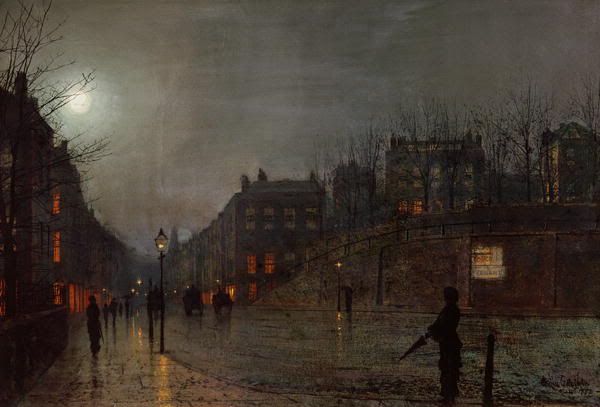
In short, the very idea of Black Friday, with its emphasis on sales and saving the retail sector from disaster, with fights over the last sale item or breakdowns over getting to said item a few steps too late, its innate and ineradicable commercialism, the lights and sales signs, brings out something—grinchy—in me: cynical, critical, and altogether not in the proper spirit of the season.
All of which may explain, by the scenic route, why one of my favorite songs come Christmastide is Gordon Lightfoot’s almost Dickensian "Circle of Steel".
Rows of lights in a circle of steel
where you place your bets on a great big wheel. . .
Set among the poverty-stricken classes of some anonymous big city, "Circle of Steel" reminds us that Black Fridays are, far from being once-yearly orgies of spending and screaming that enable retailers to finish the year "in the black", dark and ugly everyday realities for some.
Two women form the core of the song: one an alcoholic whose doctor, "found on his welfare round", spends only the minimum time necessary with his patients; the other, the poor but honest wife of a man doing time because his "pride was his means to provide"—an almost sure bet that his pride drove him to some criminal act, rather than deal with the welfare system which is supposed to catch those in the act of falling through the cracks.
Violence implied?
"Deck the Halls" was the song they played
In the flat next door where they shout all day. . .
And yet, out in the street, no one is aware of this deadly cycle of poverty and hopelessness as they come and go on their business, their busy-ness an insulation.
Sights and sounds of the people goin’ round
Everybody’s in step with the season. . .
No, they aren’t. No. . .they aren’t.

The painting "Going Home at Dusk" was done by British artist John Atkinson Grimshaw in 1882.
Gordon Lightfoot originally recorded "Circle of Steel" for his album SUNDOWN in November 1973. Released the following April, the title song became arguably his most famous hit, while "Circle of Steel" remains relatively obscure. His version is not available online; this is a very good cover by Brian E.

I have heard this album several times, so I must have heard this song; but I have no memory of it.
ReplyDeleteThank you for rescuing it from obscurity.
The original recording has this lovely, very melancholy little flute riff, accompanied only by an acoustic rhythm guitar, that you would no doubt remember, Barry. Definitely a Lightfoot tune that deserves to be less obscure, but probably remains that way because it's not cheery Christmas music. Cuts way too close to the bone. Glad you dropped by!:)
ReplyDeleteI find the tune actually quite bouncy and pleasant and very Gordon Lightfoot.
ReplyDeleteMakes an interesting counter point to the lyrics which are quite grim and unflinching.
hey Fairweather, interesting song, never heard it. Makes you think about it, doesn't it?
ReplyDeleteAs far as Black Friday, I never did any shopping either.